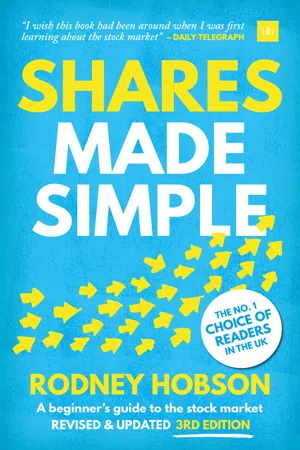![]()
Part One: Shares
![]()
Chapter 1. What are Shares?
If you are going to invest through the stock market, we had better start with what it is that you are actually buying.
You will be buying what are known as ordinary shares. You, together with all the other investors who have bought shares in a particular company, will become the owners of that company. You have a right to a say in the decision making and you share the profits through the payment of dividends.
These shares are often referred to as equities. They represent ownership of the company, just as you have equity in your house: the percentage of your house that you own when the building society’s loan is deducted.
The names of the shareholders and the number of shares held will be kept on a share register. Each time a batch of shares changes hands, the new shareholder will be recorded on the register.
There is a difference between running a company and owning it
The day-to-day running of the company will be carried out by a board of directors who may act as if they own the company but they do not. It is you, and the other shareholders, who are the owners. The directors do have the right to own shares. Indeed it is normal for them to buy shares as a show of faith in the company they are running. They have exactly the same rights as shareholders as you do.
Companies must hold an annual general meeting (AGM) to which all shareholders are invited, irrespective of how many shares they own. Votes are taken to approve the annual accounts, elect or re-elect directors, agree on the appointment of auditors and ratify the proposed dividend.
Companies may also call an extraordinary general meeting (EGM) if approval is needed for non-routine matters such as the launch of a large takeover bid for another company. Again, all shareholders must be notified and given the opportunity to attend and to vote.
The number of votes you have and the size of your share of the profits depend on how many shares you own. If you have 1,000 shares in Marks & Spencer and someone else has 10,000 shares then they have ten times as many votes as you do and they will receive ten times as much in dividends. Every share carries one equal vote.
Stocks or shares?
In the United Kingdom the two terms ‘stocks’ and ‘shares’ have become virtually synonymous but the latter (and ‘shareholders’ rather than ‘stockholders’) is normally used, so this is the term that will be used in this book.
The Americans tend to refer to ‘stocks’ but they are talking about the same thing as our shares.
Each share has a nominal value. This is basically what the value of each share was when the company was originally formed.
If you have a penny black stamp in your possession, it was originally issued back in 1840 for 1p. That is its nominal or face value, not its value today. It can be sold for whatever a stamp collector is prepared to pay for it, which will be several million pounds. Similarly, you should not expect to pay the nominal value of a share. You have to pay whatever price the share commands on the stock market. Thus it is the market value of shares, not the nominal value, that matters.
Where do shares come from?
In the first instance, shares are issued by the company when it is set up. Investors put money in to get the company going. Premises have to be bought or rented, machinery may be needed, staff have to be paid, materials bought… all this before any money comes in from customers. In return, the investors are allocated a stake in the company.
Money, or capital as it is referred to, is one of the many inputs that a company needs. Capital can come through the foun...
